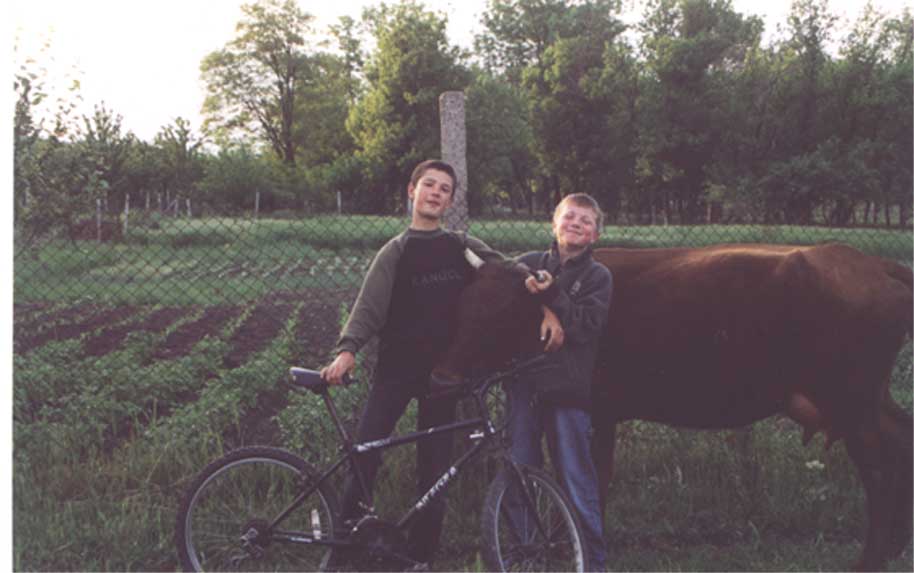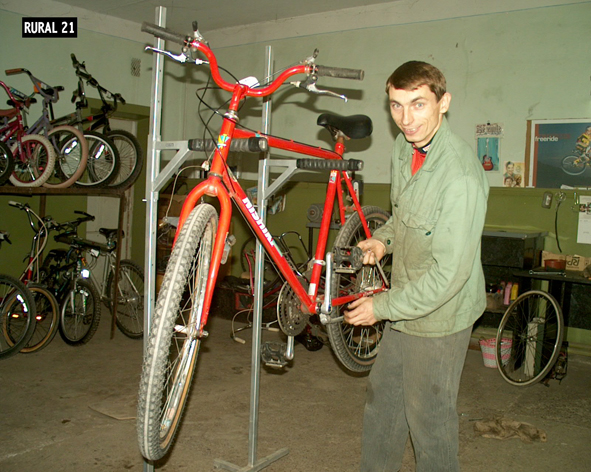The
Man Who Fits the Bikes
by Andrei Rusanovschi
Stefan Voda, August 2005
He started repairing old Soviet bikes in his apartment to earn
money for food. He built up his skill of talent and sweat. Bikes
have changed his way of life and he changed the way bikes run
across Stefan Voda and, ultimately, across Moldova.
Stefan Voda is a small city, situated not far from the Black Sea,
and not too far from the capital of the Republic of Moldova, Chisinau,
but far enough to have its unique salt and quietness.
Since ’91, after the fall of Soviet Union, many aspects
of Moldova’s infrastructure were ruined, including the roads
and public services.
Stefan Voda’s public transport system has never been petted;
by anybody. The system has simply never existed. That is why bikes
play such an important role in communicating the so-called private
sector with the center of the town.
In Stefan Voda the bikes shop is accommodated in the building
of Maria Biesu School of Arts. Walking down the steps to the bikes’
atelier one feels little by little the smell of rubber. The smell
have already became characteristic and is readily associated with
bikes—no other place in Stefan Voda has that many and such
a big variety of them. Everyone knows “if you want good
bikes at good prices, go the store at the basement.”
The atelier, once a messy and unorganized place, now looks like
it found a master. The room that once was too small to house two
hundred bikes is now transformed into a neat bike store and a
fitting shop, accommodating four hundred plus bikes of different
sizes, models and function.
When you enter the atelier you see an energetic guy, always busy
with fitting the bikes and making the place he is working in better.
Even from bikes rests, inventing his own modifications and fitting
them, Valeriu makes bikes virtually from nothing. Let alone fitting
bikes in such a good condition that came with the third shipment
from the Pedals for Progress.
To a big extent, it is due to Valeriu that the Moldova #3 project
became possible, or at least potentially viable, says Vitalie
Rusanovschi, director of Center “Rural21”—the
NGO that administrates the project in Moldova. Valeriu started
repairing bikes in his small one-bedroom apartment.
“I
never thought I would deal with bicycles on the professional level,”
says Valeriu. “I just liked riding them when I was little.
And, as a kid, I always liked to see what’s inside.”
After the Army I had to choose what direction to take, says Valeriu.
I decided to go further with my education and studied automobiles.
While studying in Chisinau, fate brought me together with a bike
service center. This is when I began to study the subtleties of
bike mechanics.
Now he works with Center “Rural21”, the regional NGO
promoting democracy, healthy life style and sustainable development.
Pedals for Progress project is running in Moldova for the third
time. The previous two shipments made essential improvements to
the public transport infrastructure. It is readily visible when
coming to the town.
“[I could instantly] see that Stefan Voda is now much better
[equipped with] bikes than ever before,” says Mark Skelton,
the Peace Corps Volunteer in Moldova who was the first to contact
Pedals for Progress Company in 2002, bringing to life the shipment
from USA of the first container of bikes. Mark visited Stefan
Voda during the second week of August 2005. It has been two years
since he finished his duty in Moldova with Peace Corps.
“I am impressed how Valeriu has organized his
workplace,” says Mark. “It is neat and well
structured, and it seems he improves it every second,” says
Mark after having a half-a-day visit to the bikes’ store.
“The
best gratitude for me would be the bike I fit to never come back
for repair,” says Valeriu. “I will just welcome
them at least once a year for maintenance work.”
With Pedals for Progress project, proved to be sustainable and
a long lasting relationship, and with Valeriu Soloviov responsible
for the fitting process, we will fill Moldova up with reliable,
environment friendly means of transport—bicycles, said Center
“Rural21” director, Vitalie Rusanovschi.
back to top

